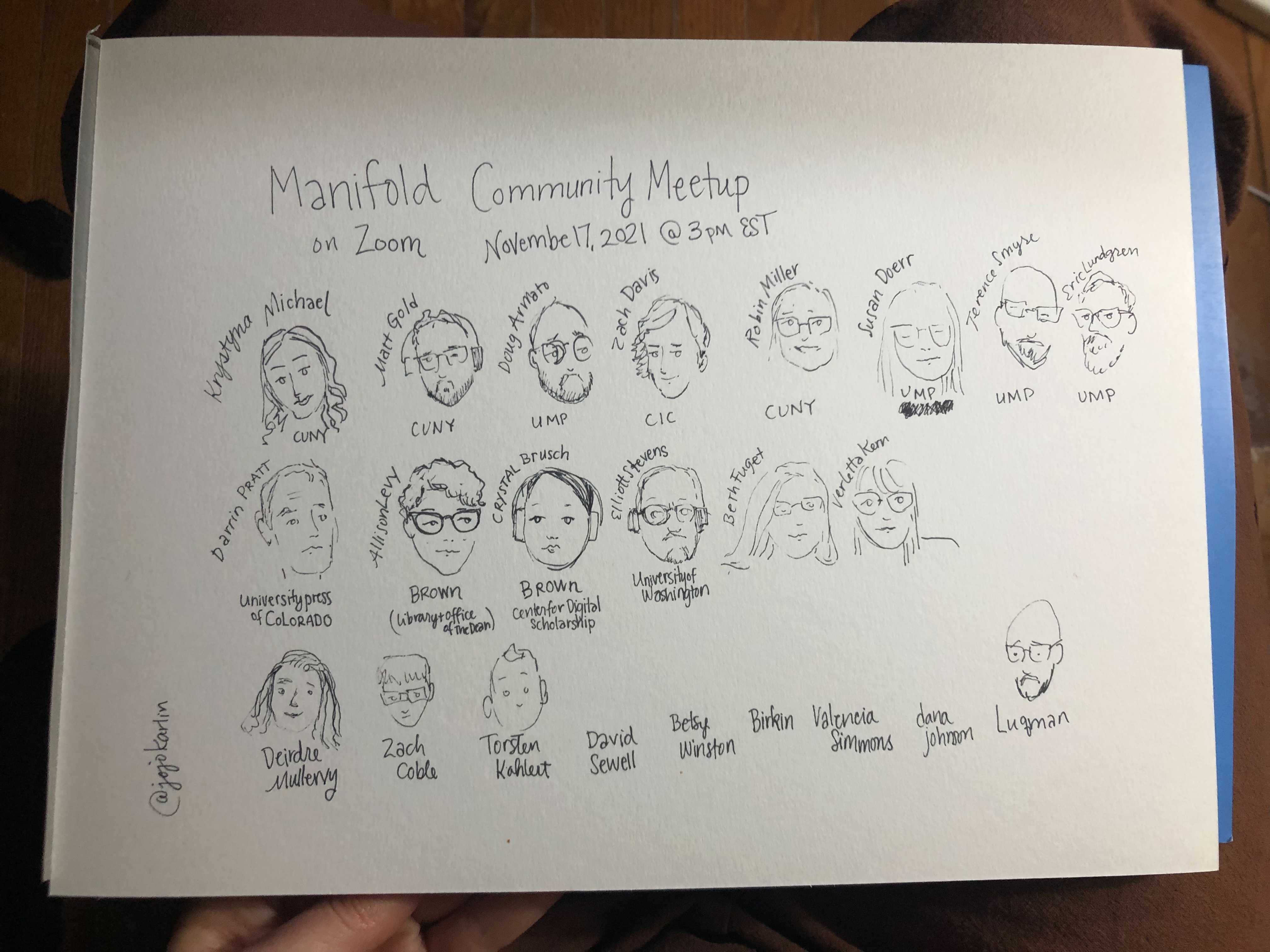#NextUP: Manifold: Digital Publishing as a Thing of Beauty
This year’s #UPWeek coincides with a meeting of the Manifold Team—representatives from the three founding partners, the CUNY Graduate Center, Cast Iron Coding of Portland, OR, and the University of Minnesota Press. We’ll all be meeting halfway between Portland and NYC in Minneapolis, seeing each other in person for the first time since the pandemic began.
Five years in, it seems like a good time to reflect on a digital publishing platform that has grown and evolved significantly since the launch of its first version in 2018. Now used by over thirty publishers, many of whom began through a pilot program generously funded by The Andrew W. Mellon Foundation, Manifold just released its seventh version earlier this year.
Home to hundreds of publications, many of them enhanced with video and audio resources, highlighted and annotated by readers around the world, Manifold was designed to extend the print book into the digital space, without sacrificing the beautiful reading experience that a well-designed print book provides. It remains an open source project, benefitting from community feedback and community-funded features.
With the new journal features of v7, Manifold now hosts publications such as Ada, Cultural Critique, and the Journal of Interactive Technology and Pedagogy, creating unique digital hubs where these journals’ reader communities can meet and interact. A lot of time and thought has gone into improving the platform for open educational resources (OERs) as well, in collaboration with Manifold publishers such as Affordable Learning Georgia and the Open Education Network, allowing teachers to create and curate Project Collections across Manifold instances, making it possible to frame an entire syllabus within Manifold. We’ve continued to see the platform used to create digital editions of public domain texts that can be highlighted, annotated, and discussed in public or private reading groups in the classroom.
The analytics features have been a favorite of publishers and authors since they were launched in v6—and I can say firsthand what a pleasure it is to be able to report the exact number of engagements, highlights, annotations on an author’s text. Authors continue to get excited about the expanding capabilities of Manifold to enhance and expand their work, and the fact that Open Access allows their work to resonate broadly and internationally.
Of course, each press has its own reasons for turning to a platform like Manifold. At a recent Manifold Community Meetup, Managing Editor Deirdre Mullervy of Gallaudet University Press explained that the press had received a directive from their administration to include more sign language video in their texts, which was what led them to the Manifold platform initially. They have since expanded their offerings significantly, and released a recent guide to bilingual Deaf Education Studies that has become one of the most visited resources on their site.
Here at Minnesota, our Manifold instance now hosts almost 200 projects, far outstripping our initial projections. It has allowed us to release a dozen monographs open access, through the TOME program, and several more through the new Fellowships Open Book program at the NEH. It has also allowed us to work out individual arrangements with both new and backlist authors to open their work through Manifold, in cases where their universities or funding agencies have resources to support open access. Authors who envision multimodal works, or iterative projects that will be published in stages, come to us directly—sometimes specifically because of our association with Manifold. The platform’s ongoing accessibility work has informed our own efforts to make Minnesota books more accessible to all readers.
A recent Modern Philology review of Whitney Trettien’s Cut/Copy/Paste, which has over 400 resources added to its Manifold edition, gives a sense of how far the platform has come. “The printed version of Cut/Copy/Paste is, unusually, no longer the nimblest or richest form to read for review,” reviewer Georgina Wilson wrote. “Through a spiraling array of content ... this volume practices the very affordances of multimedia publishing that it describes.”
With authoring functionality and a payment authorization gateway coming in its next version, now is a great time for university presses to check out the Manifold website where you can learn a lot more about all the possibilities of the platform and start envisioning your own Manifold instance. Or just spend some time with a Manifold text to see how it looks and feels. For all the growth of the platform and the community around it, Manifold has thrived by keeping the reader at the center of it all.
For more #UPWeek posts showcasing the essential work of university presses, please visit this link.
Eric Lundgren
Outreach and Development Manager
University of Minnesota Press
